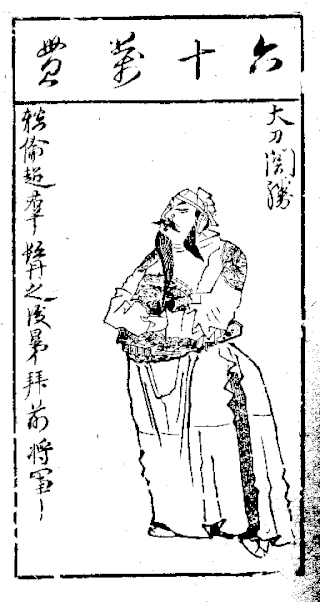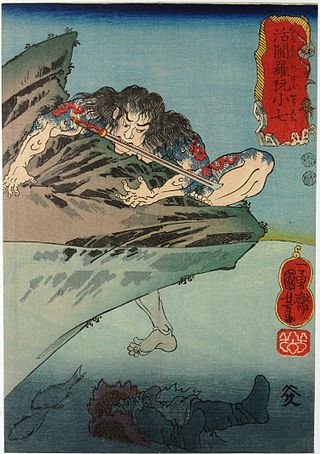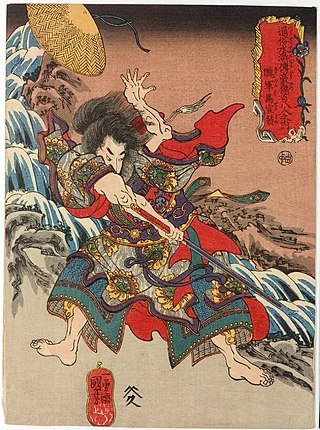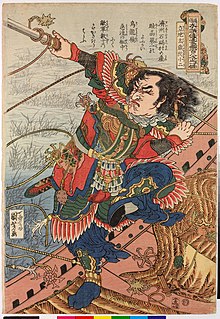
Yang Zhi is a fictional character in Water Margin, one of the four great classical novels in Chinese literature. Nicknamed "Blue Faced Beast", he ranks 17th among the 36 Heavenly Spirits, the first third of the 108 Stars of Destiny.

Wu Yong is a fictional character in Water Margin, one of the Four Great Classical Novels in Chinese literature. Nicknamed "Knowledgeable Star", he ranks third among the 36 Heavenly Spirits, the first third of the 108 Stars of Destiny.

Huyan Zhuo is a fictional character in Water Margin, one of the Four Great Classical Novels of Chinese literature. Nicknamed "Double Clubs", he ranked eighth among the 36 Heavenly Spirits (天罡), the first third of the 108 Stars of Destiny.

Guan Sheng is a fictional character in Water Margin, one of the Four Great Classical Novels of Chinese literature. Nicknamed "Great Blade", he ranks fifth among the 36 Heavenly Spirits, the first third of the 108 Stars of Destiny.

Zhang Qing is a fictional character in Water Margin, one of the four great classical novels in Chinese literature. Nicknamed "Featherless Arrow", he ranks 16th among the 36 Heavenly Spirits, the first third of the 108 Stars of Destiny.

Gongsun Sheng is a fictional character in Water Margin, one of the Four Great Classical Novels in Chinese literature. Nicknamed "Dragon in the Clouds", he ranks fourth among the 36 Heavenly Spirits, the first third of the 108 Stars of Destiny.

Liu Tang is a fictional character in Water Margin, one of the Four Great Classical Novels in Chinese literature. Nicknamed "Red Haired Devil", he ranks 21st among the 36 Heavenly Spirits, the first third of the 108 Stars of Destiny.

Chao Gai, nicknamed "Pagoda-Shifting Heavenly King", is a fictional character in Water Margin, one of the Four Great Classical Novels of Chinese literature. He is not one of the 108 Stars of Destiny because he dies before the Grand Assembly of the 108 Stars. However, after his death, he serves as a spiritual guardian of the outlaws, who from time to time dedicate ceremonial sacrifices to him.

Ruan Xiaoqi, also known as Ruan the Seventh, is a fictional character in Water Margin, one of the Four Great Classical Novels in Chinese literature. Nicknamed "Living King Yama", he ranks 31st among the 36 Heavenly Spirits, the first third of the 108 Stars of Destiny.

Ruan Xiaowu, also known as Ruan the Fifth, is a fictional character in Water Margin, one of the Four Great Classical Novels of Chinese literature. Nicknamed "Lives-Shortening Second Brother", he ranks 29th among the 36 Heavenly Spirits of the 108 Stars of Destiny.

Xuan Zan is a fictional character in Water Margin, one of the Four Great Classical Novels in Chinese literature. Nicknamed "Ugly Prince Consort", he ranks 40th among the 108 Stars of Destiny and fourth among the 72 Earthly Fiends.

Zhu Tong is a fictional character in Water Margin, one of the four great classical novels in Chinese literature. Nicknamed "Lord of the Beautiful Beard", he ranks 12th among the 36 Heavenly Spirits, the first third of the 108 Stars of Destiny.

Ling Zhen is a fictional character in Water Margin, one of the Four Great Classical Novels in Chinese literature. Nicknamed "Heaven Shaking Thunder", he ranks 52nd among the 108 Stars of Destiny and 16th among the 72 Earthly Fiends.

Lei Heng is a fictional character in Water Margin, one of the Four Great Classical Novels of Chinese literature. He ranks 25th among the 36 Heavenly Spirits, the first third of the 108 Liangshan heroes, and is nicknamed "Winged Tiger".

Kong Liang is a fictional character in Water Margin, one of the Four Great Classical Novels in Chinese literature. Nicknamed "Lonely Fiery Star", he ranks 63rd among the 108 Stars of Destiny and 27th among the 72 Earthly Fiends.

Bai Sheng is a fictional character in Water Margin, one of the Four Great Classical Novels in Chinese literature. Nicknamed "Daylight Rat", he ranks 106th among the 108 Stars of Destiny and 70th among the 72 Earthly Fiends.

The Water Margin, also known Outlaws of the Marsh and Seven Blows Of The Dragon, is a 1972 Hong Kong film adapted from the Chinese classical 14th-century novel Water Margin. It was produced by the Shaw Brothers Studio and directed by Chang Cheh. Godfrey Ho was assistant director.

The Water Margin is a 1998 Chinese television series adapted from Shi Nai'an's classical 14th-century novel of the same title. It was produced by CCTV with Zhang Jizhong as producer. It was first broadcast in China in January 1998. The series also featured action choreography by Yuen Woo-ping.

Outlaws of the Marsh is a Chinese television series adapted from Shi Nai'an's classical 14th century novel Water Margin. It was first broadcast on Shandong TV in China in 1983, and was not completed until 1986. The series was one of the earliest television dramas with an ancient China setting to be produced in mainland China. It was divided into different parts, each focusing on the story line of a certain character. Widely regarded, as a classic in mainland China, the series won a Golden Eagle Award.



















